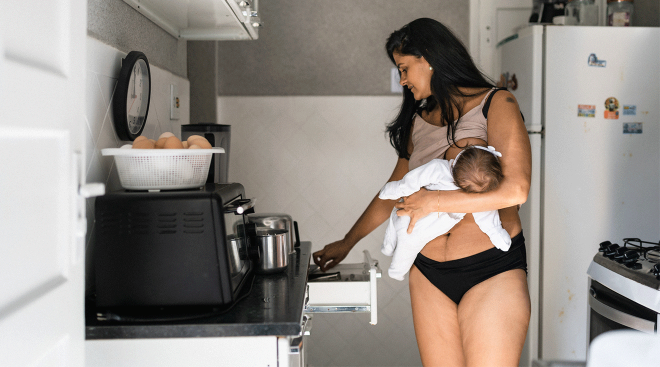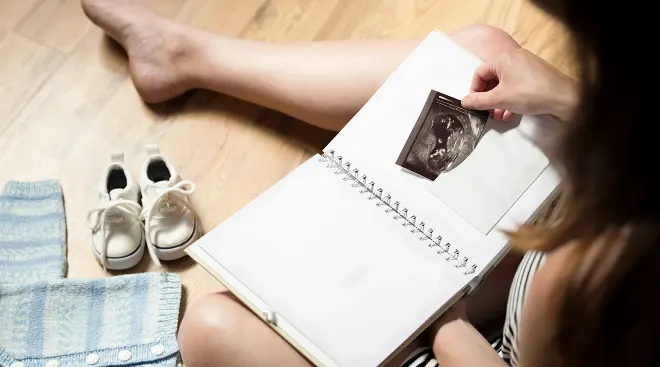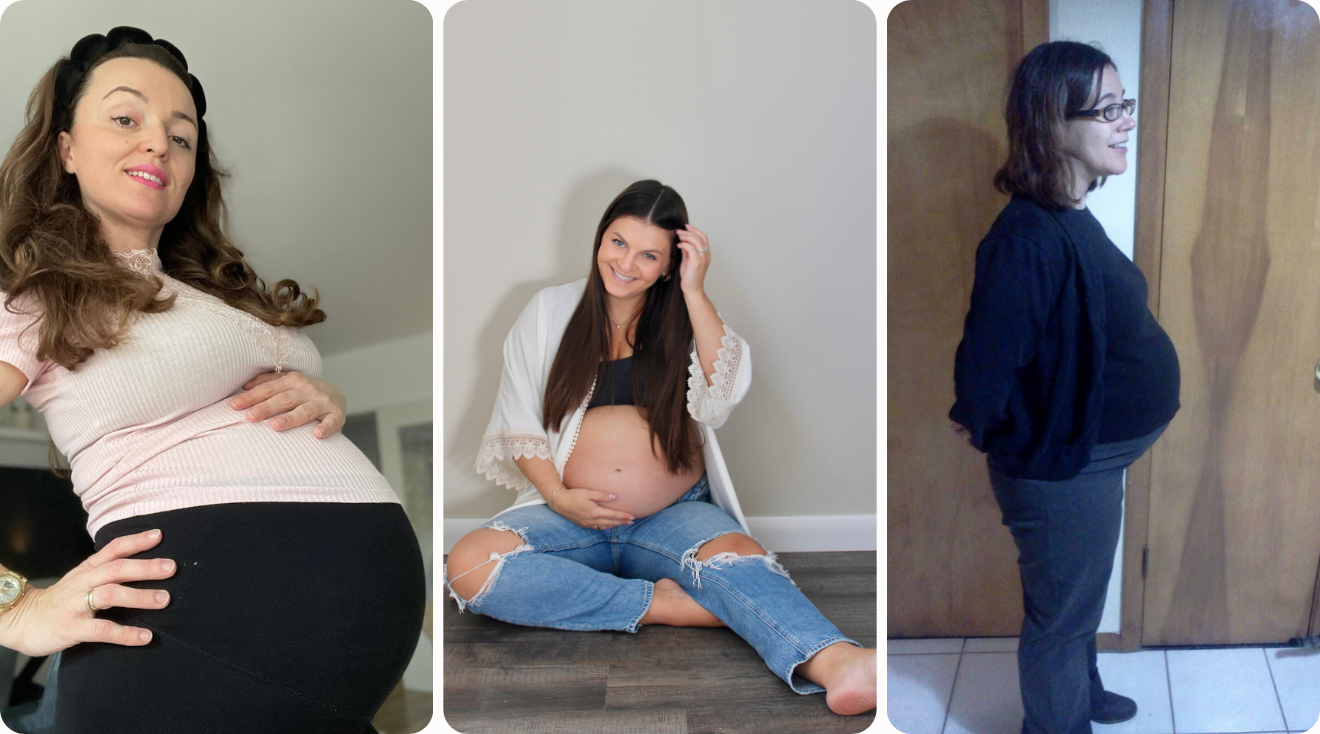- Late pregnancy symptoms abound. Look out for exhaustion (it’s like you’re back in the first trimester again), swollen ankles and so much pressure. Baby’s weight and position may result in hemorrhoids, frequent (and sometimes involuntary) pee breaks and general discomfort in your pelvic area.
- You’ve maxed out on amniotic fluid at this stage of the game, and baby is in tight quarters. All this to say: It’ll feel like you couldn’t possibly get any bigger.
- Keep doing your kick counts and take mind of Braxton Hicks contractions. If they’re getting stronger or more frequent, give your doctor a call. You want to make sure you’re not in preterm labor.
- Baby really looks like, well, a baby at this point! They’ll fill out a bit more in the next six weeks. Most preterm babies born at 34 weeks will be healthy; they might just need some extra time and care in the NICU.
Your curious baby can hear your voice and is listening in on your conversations at 34 weeks pregnant. In fact, baby might enjoy a lullaby or two. Some experts say that, after birth, babies can recognize songs mom sang while pregnant; they may even be more easily soothed by those familiar tunes once they're “on the outside.” And no, baby won’t care if you’re singing a bit off-key.
Baby’s skin is getting ready for life outside the womb as the vernix that protects it begins to thicken. The vernix is a barrier between baby’s developing skin and amniotic fluid. Eventually, it will also help protect baby’s skin during delivery.
If you’re having a boy, he’s going through some big changes this week. At this point, his testicles will be descending from his abdomen into his scrotum. Who would have expected that hearing this information could be so exciting?
Basically, baby at 34 weeks looks a lot like they will when they’re born, just with less body fat. At this point, it’s all about the finishing touches.
How big is baby at 34 weeks?
At 34 weeks pregnant, baby is the size of a butternut squash. With less than two months until go time, baby weighs in at about 4.7 pounds and measures about 17.7 inches.
What does baby look like at 34 weeks?
Baby’s fingernails have grown in, their skin is smoothing out and they keeps putting on weight. You’ll be seeing what baby looks like very soon!
34 weeks pregnant is how many months?
At 34 weeks pregnant, you’re eight months pregnant, give or take. You’re only about six weeks away from becoming a mom!
34 week ultrasound
You’ll likely take a trip to the OB this week, since you’re probably seeing them every other week. If your doctor orders it, you could have a biophysical profile (BPP), which is a combination of a 34 weeks pregnant ultrasound and a special non-stress test, which measures baby’s heart rate over a period of 20 minutes. Together, these two tests help the doctor confirm that baby is reacting well to stress and thriving.
Enjoy having next week off, because starting at week 36 you’ll have weekly OB appointments. You’ll probably have a Group B strep test around 36 weeks too, which involves a vaginal and rectal swab. Ten to 30 percent of pregnant women test positive for the Group B strep bacteria, which could be harmful to baby if passed to them during delivery. If you test positive for Group B strep, it’s no biggie—you’ll just have to take some antibiotics during labor and delivery. Maybe pick a new book to read during your waiting room time.
Are babies fully developed at 34 weeks?
Pretty close! A 34-week fetus can hear, see, sleep and breathe, among other things. You’ll also probably feel a lot of movement—your baby knows it’s almost time for their big debut!
Your symptoms at week 34 of pregnancy are pretty typical to late pregnancy and might seem like a broken record from here on out.
Blurry vision
A combination of hormones, fluid buildup and lack of sleep may make your vision seem a little “off.” Sometimes it’s just a normal, temporary pregnancy symptom, but if your blurry vision is accompanied by swelling, headache, rapid weight gain and/or swelling, it could be a sign of preeclampsia, so tell your OB right away.
Fatigue
It’s exhausting carrying around all that extra weight (whether you’ve got one baby in there or you’re 34 weeks pregnant with twins). And if only you could sleep at night!
Constipation
It’s normal to be stopped up at 34 weeks pregnant, which can make you feel more uncomfortable than you already are. Remember to take frequent walks, eat foods with lots of fiber (think: leafy greens) and drink lots of water to get things moving.
Hemorrhoids
What a vicious cycle! Straining when you go to the bathroom can cause this other not-at-all-fun symptom—and so can all the extra weight baby is putting on your rectum. To ease hemorrhoids, work on the constipation and try different sitting and standing positions to ease some of the pressure on the area.
Swollen ankles and feet
Sit down and put up your feet whenever you can to reduce the swelling.
Abdominal pressure
As baby prepares for arrival and settles down lower, you might feel pressure in your pelvis and even more frequent urination.
Braxton Hicks contractions
At 34 weeks pregnant, cramping sensations are totally normal. It’s likely your body is just getting ready for the real deal. Note, though, that at 34 weeks pregnant, pelvic pain could be the sign of a problem. Regular contractions that don’t stop after about an hour, vaginal bleeding and lower back pain are all signs of premature labor. If you have any of these worrisome symptoms at 34 weeks, call your OB immediately.
Is it safe to deliver at 34 weeks?
You’re so close, but baby at 34 weeks isn’t quite full term yet. (That won’t be until they reach 37 weeks.) However, at 34 weeks, baby has a great chance of being strong and healthy, like any full-term infant. Still, they may require some extra time in the hospital to make sure everything is okay before going home with you.
Your 34 weeks pregnant belly might seem a little—or a lot—lower than it did a few weeks ago. That’s because baby may have descended lower into your pelvis. This may let you breathe a little easier, since your lungs have more space. Ahh! (Some babies don’t do this until the day they’re born, so we’re not making any guarantees.) The pitfall of this descent, of course, is even more pressure on your bladder, so be prepared to make even more trips to the ladies’ room over the coming weeks.
At 34 weeks pregnant, your belly should measure about 32 to 36 centimeters from the top of the uterus to the pubic bone. If you’re measuring a bit big or a bit small, it could mean baby is bigger or smaller than average or in a breech or sideways position, or that there is an abnormal level of amniotic fluid. Anything out of the ordinary with fundal height (that belly measurement) may prompt your doctor to order a 34 weeks pregnant ultrasound to figure out the cause.
Fun fact: Amniotic fluid is at an all-time high between weeks 34 and 36, so you might feel as if your belly isn’t getting too much bigger after this point. That’s because fluid will decrease so baby can keep growing and have room to wiggle around. Still, they’re getting snug in there, causing movement to start to feel slightly different around this time.
Continue checking in on baby by doing kick counts. Twice a day, set a timer and see how much time it takes baby to move 10 times. (It should be an hour or less.) Let your doctor know about any notable changes.
If you’re 34 weeks pregnant with twins, you might be feeling pretty antsy. That could be a subtle psychological sign that the babies are coming soon. For twin moms-to-be, the countdown is officially on, since most twin pregnancies are delivered at around 36 weeks.
If you’re feeling that urge to nest, embrace it! Cleaning, organizing and decorating are a few things you actually have some control over during your pregnancy. It’s also a great way to help relieve some nervous energy or anxiety. Make a realistic, achievable list of things you would like to get done to help you feel better prepared. Then, enlist and delegate some help!
You might be ready to get this show on the road, but you have a few more weeks to go. Hang in there. Here’s what you can do now to help prioritize your health and wellness.
Pass on the salt
Swollen feet are tough enough to deal with—don’t make them worse by adding fluid-retaining salt to your foods. Keep an eye on any prepared foods you eat too, and choose low-sodium versions when you can.
Drink water… and then drink some more water
If you’ve got Braxton Hicks, it could be a sign that you need to drink more water—dehydration is a big contributing factor for these contractions. And because water helps relieve and prevent constipation, drinking a lot of it is doubly good for you!
Take care of your bottom line
Hemorrhoids aren’t fun, but you can make them a little more bearable by treating them with some TLC. A warm sitz bath and witch hazel pads can help, and so does spending plenty of time on your feet—sitting too long puts pressure on the blood vessels affected by the hemorrhoids. Constipation is another cause of hemorrhoids, so do what you can to keep everything running smoothly.
Wind down for the evening
Get your mind and body ready for bed each evening, and you may have a better chance of sleeping through the night. Try a few gentle prenatal yoga stretches at night to soothe aches and pains, eat at least three hours before bedtime to give your meal time to digest and skip the late-night TV talk shows or social media scrolling—the light from screens can mess with your body clock, preventing you from falling asleep. If you need something to help you doze off, read a few pages of a book instead.
Frequently Asked Questions
Are there pregnancy pressure points to start labor?
There do appear to be pressure points that can induce labor, and some pregnant women utilize acupuncture for this very reason. Studies have found that there’s a potential increase in spontaneous labor within 24 hours of acupuncture than without intervention. However, at 34 weeks baby still has a lot of growing to do, so it’s best to steer clear of this kind of intervention to avoid premature labor. Additionally, even as you get closer to your due date (or even pass it), you should speak with your provider before trying to induce labor this way to ensure you and baby remain safe.
Is it bad to have low sodium during pregnancy?
Low sodium during pregnancy should be monitored closely by your provider, but it’s not necessarily cause for alarm, as pregnancy affects the body’s natural balance of salt and water, and it’s normal for sodium levels to decrease. If sodium levels get too low, however, you may notice symptoms such as headache, dizziness, drowsiness and general discomfort, which you should report to your doctor. While uncommon, significantly low sodium levels can become dangerous. The good news? If you do experience low sodium during pregnancy, it’s typically easy to manage and treat.
Can watching television affect my pregnancy?
You’re often told to put your feet up and relax during pregnancy, and many expecting parents will put on their favorite TV show to keep them entertained while following this advice. Watching TV while pregnant isn’t harmful, in and of itself, but it’s important to maintain healthy habits. It's common for people to watch TV (or scroll on their phone) for prolonged periods of time during pregnancy, but if you’re not also getting in some physical activity, this can increase your risk for gestational diabetes. ACOG and the CDC recommend pregnant people get 150 minutes of moderate physical activity per week to maintain a healthy pregnancy.
How do you get Group B Strep in pregnancy?
Group B Strep (short for streptococcus) is caused by a bacteria that lives in people’s gastrointestinal and genital tracts and around 1 in 4 pregnant women carry the bacteria. This bacteria can spread—but how people spread remains unknown. Most people who carry the bacteria have no symptoms, so they don’t even know they have it—which is why your ob-gyn will test you for it, and it’s typically not dangerous (in rare cases it can cause infections). However, it’s known that women with Group B Strep can pass it to their babies during delivery.
Is it common to experience hearing issues during pregnancy?
Pregnancy has been known to affect the ears in different ways, including loss of hearing, the feeling of ear blockage, tinnitus and even vertigo. These are relatively common, and you may even notice headaches too. The reasons for these changes in your ears include hormones, increased blood flow, high blood pressure, iron deficiency and in some rare cases bone growth. Additionally, pregnancy can sometimes cause swelling in the sinuses, which includes the ears. If you’re noticing a significant change in your hearing, it’s important to tell your provider, but rest assured that it’s likely just another common side effect of pregnancy.
What should I look out for to identify signs of premature labor in week 34?
A baby is not considered full term until it reaches 37 weeks gestation, so if you suspect labor at 34 weeks, it’s always best to reach out to your provider to be extra cautious. Some symptoms that may indicate early labor include cramping, contractions, increased pelvic pressure or pain, blood discharge, lower abdominal or back pain or leaking pink or clear fluid. If you’re in early labor, it’s important to get immediate medical care, as early intervention is essential to the health of you and your baby.
I decided not to open my shower gifts in front of my friends and family. They already knew what they got me. I just wanted to enjoy that time being surrounded by the people I love and celebrating our upcoming arrival.
Please note: The Bump and the materials and information it contains are not intended to, and do not constitute, medical or other health advice or diagnosis and should not be used as such. You should always consult with a qualified physician or health professional about your specific circumstances.
Anisha Farishta, MD, is an ob-gyn in Texas. She earned her medical degree from Texas A&M College of Medicine.
American Pregnancy Association, Fatigue During Pregnancy
Lamaze International, Swelling in the Third Trimester: What's Normal, When to Worry, What to Do, March 2018
Mayo Clinic, 3rd trimester Pregnancy: What to Expect, March 2022
University of California San Francisco Health, Recognizing Premature Labor
Cleveland Clinic, Hemorrhoids During Pregnancy, July 2022
American Pregnancy Association, Lightning Crotch Pain During Pregnancy
March of Dimes, Amniotic Fluid, September 2020
Medline Plus (National Library of Medicine), Amniotic Fluid, November 2022
Kaiser Permanente, Your Developing Baby – Week 34, July 2022
Cleveland Clinic, Kick Counts, July 2022
StatPearls, Braxton Hicks Contractions, August 2023
American Pregnancy Association, 34 Weeks Pregnant
European Journal of Obstetrics & Gynecology and Reproductive Biology, Fetal Hearing, July 1988
Plos One, Prenatal Music Exposure Induces Long-Term Neural Effects, October 2013
Neural Plasticity, Neuroprocessing Mechanisms of Music During Fetal and Neonatal Development: A Role in Neuroplasticity and Neurodevelopment, March 2019
European Journal of Clinical Nutrition, Body Composition During Fetal Development and Infancy Through the Age of 5 Years, August 2015
Iowa State University Extension and Outreach, Butternut Squash – Versatile, Nutritious, Long Keeping, and Convenient Size Make It A Favorite, September 2020
Mayo Clinic, Fetal Development: The 3rd Trimester, June 2022
Lamaze International, How Far Along Are You? Counting Pregnancy by Weeks, Months & Trimesters, September 2021
New York State Department of Health, Why Is 40 Weeks so Important?, April 2021
Mayo Clinic, Prenatal Care: 3rd Trimester Visits, July 2022
Cleveland Clinic, Biophysical Profile, December 2022
UCLA Health, Schedule of Prenatal Care
The American College of Obstetricians and Gynecologists, Group B Strep and Pregnancy, July 2021
American Pregnancy Association, Group B Strep Infection: GBS
Cedars Sinai, Group B Streptococcus Infection in Babies
Cleveland Clinic, Fetal Development, March 2023
Kaiser Permanente, Your Pregnancy: Weeks 21 to 24
American Journal of Obstetrics & Gynecology, Patterns of Fetal Breathing Activity in the Human Fetus at 24 to 28 Weeks of Gestation, 1988
Cleveland Clinic, Blurry Vision While Pregnant, May 2022
Johns Hopkins Medicine, Get a Good Night's Sleep During Pregnancy
Cleveland Clinic, Pregnancy Constipation, October 2021
Mayo Clinic, What Causes Ankle Swelling During Pregnancy — and What Can I Do About It?, June 2022
Kaiser Permanente, Pregnancy: Dropping (Lightening), July 2023
Merck Manual, Pelvic Pain During Early Pregnancy, July 2023
March of Dimes, What Is Full-term?, September 2018
University of Utah Health, When Is It Safe to Deliver Your Baby?
March of Dimes, Premature Babies, October 2019
Cleveland Clinic, Fundal Height, January 2022
Johns Hopkins Medicine, Twin Pregnancy: Answers from an Expert
Gaceta Sanitaria, Prenatal Yoga Exercise Improves Sleep Quality in the Third Trimester of Pregnant Women, October 2021
Mayo Clinic, Mayo Clinic Minute: Timing Snacks to Avoid Heartburn, November 2017
Cleveland Clinic, Why You Should Ditch Your Phone Before Bed, May 2022
Trials, Does Reading a Book in Bed Make a Difference to Sleep in Comparison to Not Reading a Book in Bed? The People’s Trial—an Online, Pragmatic, Randomised Trial, December 2021
Learn how we ensure the accuracy of our content through our editorial and medical review process.
Navigate forward to interact with the calendar and select a date. Press the question mark key to get the keyboard shortcuts for changing dates.
















































